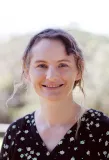Announcing aaDH’s new President
At the end of #DHA2021 – Digital Humanities Australasia, aaDH’s biennial conference – Paul Millar announced the end of his term as aaDH’s President after three years of service in the role and the hosting of a supremely successful conference. Millar has one year left on his term and, in accordance with the aaDH’s constitution, the Executive Committee called for nominations to fill the role from within the committee. As a result of this process, Associate Professor Rachel Hendery was elected as the President of aaDH.
Here’s some information about the new President of the Australasian Association for Digital Humanities:

I am Associate Professor of Digital Humanities at Western Sydney University. My background is in linguistics, and I work on language contact and change, particularly in the Pacific, and how new digital tools and techniques allow us to research these in new ways. My research interests include historical linguistics, contact linguistics, typology, mapping, simulation, virtual reality, and data visualisation.
From 2011-2014 I held an Australian Research Council (ARC) postdoctoral fellowship to conduct research on the variety of English spoken on Palmerston Island, in the Cook Islands. I am currently a CI on several further ARC-funded projects: Howitt and Fison’s Archive: Insights into Australian Aboriginal Language, Kinship and Culture’ led by Helen Gardner at Deakin University, Mapping Print; Charting Enlightenment, led by Simon Burrows at Western Sydney University, Waves of Words: Mapping and modelling the history of Australia’s Asia-Pacific ties, and Seeing Yourself in Digital Cultural Heritage, both of which I lead at Western Sydney University.
I am also a member of the MARCS Institute for Brain, Behaviour and Development, the Centre of Excellence for Language Dynamics and the Centre of Excellence for Australian Biodiversity and Heritage. I co-lead the Intergener8 Living Lab at Western Sydney University. I am the Treasurer for the Australasian Association of Digital Humanities and the NSW coordinator for the Australian Computational and Linguistics Olympiad.
The aaDH would like to thank Professor Paul Millar for his leadership during difficult times and wishes him well on his well-earned sabbatical.